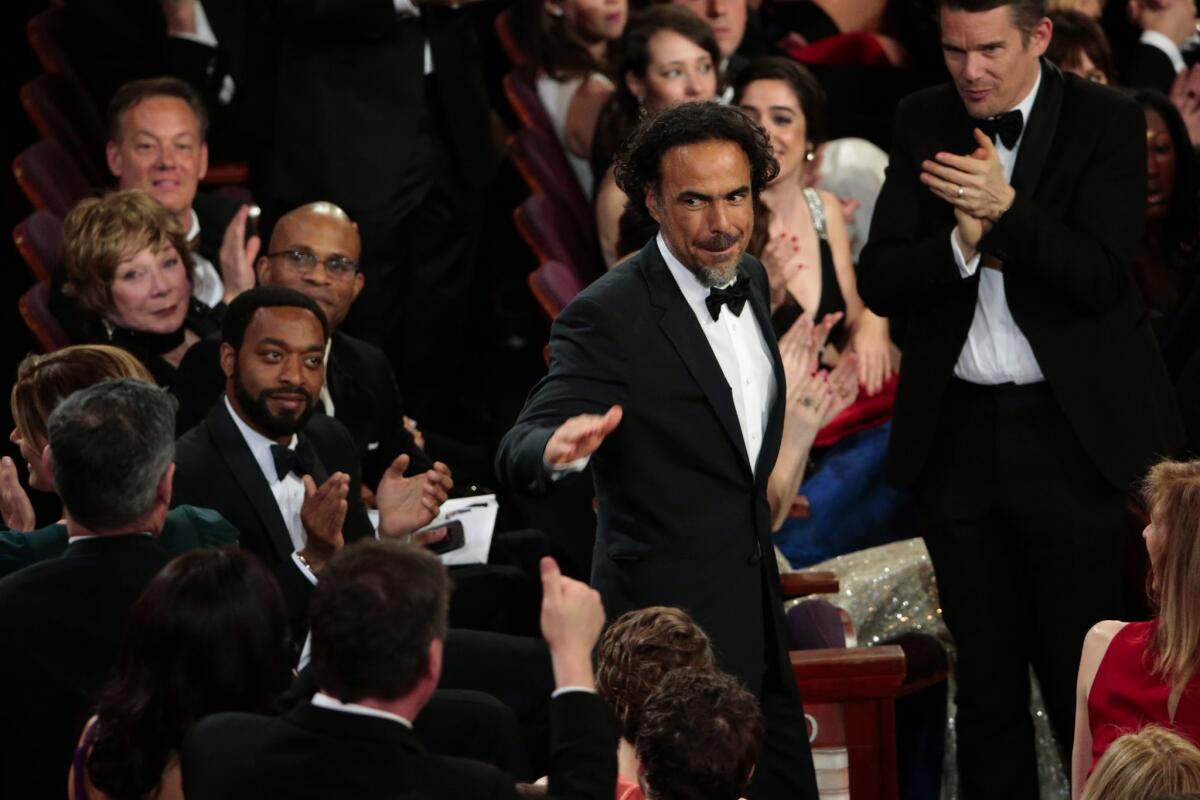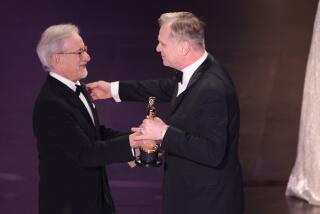‘Birdman’ director Alejandro G. Inarritu plunges into new risks

Filmmakers coming off a big Oscar win tend to take a year or more to sift through their options. Ang Lee, who won the director Oscar in 2013, still hasn’t started shooting his next film.
But “Birdman’s” Alejandro G. Iñárritu — winner on Sunday of the best picture, directing and screenplay trifecta — isn’t experiencing any Riggan Thomson-like dithering.
Iñárritu has spent the last five months shooting western-flavored movie “The Revenant” in and around Calgary with stars Leonardo DiCaprio and Tom Hardy, and will continue doing so at least until April. The director’s awards-season stops were often built around trips to Los Angeles (where he lives with his family) from rural Canada, where he and cinematographer Emmanuel “Chivo” Lubezki have been scouting or shooting in harsh conditions.
FULL COVERAGE: Oscars 2015
“The Revenant” examines a 19th century frontiersman (DiCaprio) who is mauled by a grizzly bear and the complicated consequences that ensue for both him and his men. As a period survival tale with numerous outdoor shots, it’s a further genre break for Iñárritu, who began his feature career with hard-boiled dramas such as “Amores Perros” “21 Grams,” and “Babel”--all of which ushered in, and eventually out, the modern triptych film.
“For me, it’s absolutely scary,” he told The Times in the fall as he was preparing to shoot “Revenant.” “It’s another genre, and I’m a tropical banana confronting 30 degrees below zero, and I’m afraid of zeros. I don’t know how I’m going do the film. [But] making ‘Birdman’ I learned--and maybe I should have done this before--but I learned that I should risk a little more. I should explore more things I’m not necessarily comfortable with.”
Switching plans
Based on Michael Punke’s novel and inspired by real-life events, “The Revenant” was supposed to be Iñárritu’s next film after his 2010 Spanish-language drama “Biutiful.” But when the long-gestating project again became stuck in development, he found himself unsure of his next step. Iñárritu began assembling writers, and toying with ideas, for “Birdman,” which is loosely based on his own creative struggles.
A window opened to make that movie in spring 2013. So Iñárritu tabled “Revenant” before returning to it this fall with the backing of 20th Century Fox and “Birdman” financier New Regency. Scheduled for release at Christmas, it will be Iñárritu’s first movie with a big studio (others were with a specialty division or independent distributor).
Iñárritu has acknowledged he had become something of an on-set powder keg in recent years. So he has sought new ways to relax.
On the set of “Revenant,” he told The Times, he has instituted a practice in which a bell sounds at an appointed hour, forcing everyone to stop working for a short time. That leads to a healthier life, he believes, and makes for better work besides.
Despite an Oscar’s strange power to quell anxieties, success comes with its own burdens. Having now fought off the perceptions that he was either relentlessly downbeat or a one-trick pony, Iñárritu will now confront a different obstacle — himself, as new movies are inevitably compared to “Birdman” and its outsized success. Tom Hooper, whose “The King’s Speech” also won the picture-director-screenplay trifecta, in 2011, found many pundits unholstering their guns for his follow-up “Les Misérables” two years later.
Already, the “Birdman” director has, well, ruffled some feathers. Beginning with this film, the director dropped the “Gonzalez” portion of his name--in keeping with Mexican tradition, his family name--in favor of the initial “G.” He has said it was simply a matter of trying to offer less of a mouthful to American audiences, but some on social media have seen it as a more troubling sign of deracination.
It is a concern that might be addressed by Iñárritu’s own invoking of his heritage, as he did at the conclusion of Sunday’s Oscars, when he joked about the successive director wins by himself and countryman Alfonso Cuarón. Guillermo del Toro, who is the third leg of that Mexican directors tripod, said that Iñárritu has been and continues to be a hero to many aspiring filmmakers in his native country.
OSCARS 2015: Complete list | Show highlights | Red carpet | Quotes from the stars | Backstage | Top nominees | Q&As with the contenders
“When we were growing up you could not have more than one model,” Del Toro said, explaining that it was pretty much local Spanish-language cinema or nothing at all. “That is why I think Alejandro getting [many awards] and keeping the chain going is sending a message that it’s not a fluke.”
Iñárritu said in an interview last week that going through the release rollout and awards circuit offered perspective to him too--particularly about what was possible as a filmmaker and a person.
“The impact of this film made me feel happy and proud, but at the same time hopeful that … people recognize themselves,” he said. The real people they are, he made sure to add, “not the comfortable idea of who we would love to be.”
Looking to the filmmaking picture, he added, “I think there’s an infinite ocean that can be explored [cinematically], which we haven’t because of financial constraints. This has become more important than the art itself, and I hope this opened a tiny little door.”
Times staff writer Lorraine Ali contributed to this report.
More to Read
Only good movies
Get the Indie Focus newsletter, Mark Olsen's weekly guide to the world of cinema.
You may occasionally receive promotional content from the Los Angeles Times.











